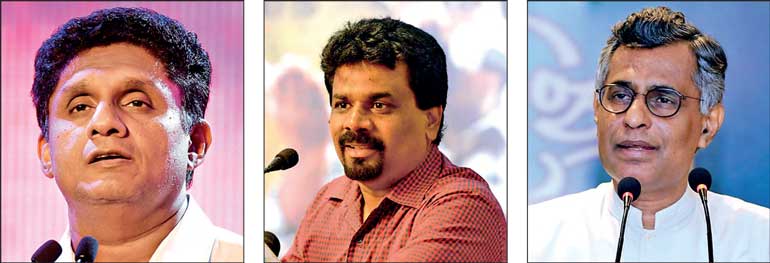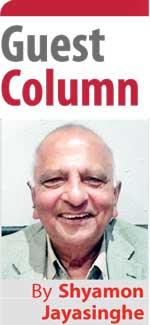Thursday Mar 05, 2026
Thursday Mar 05, 2026
Saturday, 22 January 2022 00:00 - - {{hitsCtrl.values.hits}}

Constituents of a Hawula must only be chosen from those among those who have a common consensus with regard to a policy framework and strategy that derives from such common vision
 Reg flag
Reg flag
Just a few days ago, the Central Bank sold half of its gold reserves. Gold reserves are sold only as a last resort when there aren’t any options. That happens when a country is in default and on the economic precipice. That act gives the wrong signals to the banks, lenders, exporters and foreign investors. It is the red flag.
The Gotabaya government is in deep trouble. Things have come to such a sorry pass during such a short time such as two years after his government came to power with a massive two-third majority.
As I have written many times in these columns, the possession of a parliamentary majority and, add to that, the construction of constitutional firewalls of power protection cannot keep a government in power when it is confronted with hard economic realities that strangle its existence. Ordinary voters do not understand the intricacies of the Amendment 20; nor does that matter to them in their practical living. On the other hand, if the economy is rendered dysfunctional, people on the streets will feel it jolly well in the high prices, unavailability of essentials, closure of schools, no medicines, the long queues and so on. When gas cylinders burst inside households one knows things are going too far.
Technically there are many more years for the government to hold general elections and more years for it to hold the presidential elections. On the other hand, the signs are there of an implosion before that. When the ship is sinking MPs get nervous. And when they get the intuition that they are not part of the decision-making process but mere voting hands, these MPs like to look at the exit gates.
The ‘Hawula’ or common alliance
The SLFP component of the government, it is reported, is trying to work out a common alliance with other parties or political elements – just in case. The Samagi Janabalawegaya (SJB) has been struggling for a long time to get together an alliance. The United National Party (UNP) has also announced similar moves in time to come – although they don’t seem to be in a hurry. Karu Jayasuriya is dabbling with one under the auspices of the Society for Good Governance, which he has inherited from Revd Sobitha.
The JVP already had such an outfit under the name of Jathika Jana Balavegaya (National Peoples’ Power or NPP) where they have co-opted many ‘educated’ ‘persons from civil society. Now, this ensemble is gathering some noticeable following. Many people think: “We gave X, we gave Y. Now let us give Anura Kumar Dissanayake.” The Jathika Janabalavegaya has taken a lead in the Hawula race thus far.
The phenomenon of the Hawula is certainly not new to Lankan politics. This type of political entity made a sharp presence after JR’s Constitution that changed the election system away from First-past-the-Post to PR on a district basis. Since that change it has been difficult for anyone to come to power without broadbasing away from a single party. The first such ‘Hawula’ was known as the “Hath Hawula” or the seven-pronged alliance. I may not be accurate here because it was S.W.R.D. Bandaranaike who in 1956 formed the Hawula known as Mahajana Eksath Peramuna, which today is the private property of Dinesh Gunawardena.
Forming Hawulas is a raw expression of a power struggle
The undiluted purpose of Hawulas is power grab. The key thing is to oust the current government and get into the seats of power. Typically, there are dissimilar elements within the Hawula that it would be hard to have a policy plan and a strategy announced well in advance. Hawulas, therefore, go for one-liners in expression and for vague least common factors that can respectfully keep the different power seekers respectably within the fold.
This, precisely, constitutes the source of subsequent clashes when the Hawula gets to power. The conflicts can be averted if the government dilutes its collective effort; but that would make the people feel they are neither here nor there. This lack of a coherent philosophy, vision or policy framework will operate to the bane of the Hawula and probably make way for factional breakaways, later.
In other words, a typical Hawula of the Sri Lanka type carries within its fold the roots of its own destruction.
Sri Lanka cannot any longer afford this kind of powerplay
People are sickened by the power play of politicians. Today’s seekers of power must attempt to get power to execute a vision for the future. Constituents of a Hawula must only be chosen from those among those who have a common consensus with regard to a policy framework and strategy that derives from such common vision. Coalitions, if they are meant to mean more than mere power games, must be driven by a consensus among partners on a common policy framework which tells us how different Sri Lanka is going to be with them.
A vision thus well-stated can excite the electorate and inspire voters.
Bandaranaike’s vision of a Sinhala resurgence did enormously strike the chord of people at town and village level. The “Sanga Veda Guru, Govi, kamkaru” slogan was fired at that time. I was a youngster then but I was observant of such things. Unfortunately, that vision had been socially divisive and it brought fears into smaller ethnic groups and to the Tamil community. There, the trouble began that devoured the economy and the nation and destroyed national unity. It was horrible vision but, that was an example of effective vision that has the capacity to excite.
I think our populations have now realised much more the need for an inclusive political vision. So, there you are, power seekers of the future must formulate a clear vision and plan and a clear strategy for achieving such a plan. They must build Hawulas on that basis. The present-day Hawulas’ plans must take each major area of public policy and tell the people how different they are going to be. This is the only way they can garner public support. Such a comprehensive plan must offer hope from where the people are now.
Economic policy takes first place. Social cohesion must be another. So are, policies and plans for primary industry like agriculture and fisheries, law and order, justice system, foreign policy, separation of powers, public service, overseas service, local government and regional service delivery, and corruption. In overall constitutional terms the manifesto must explain if it is for a parliamentary democracy or executive president system. Immediate, medium-term and long-term goals should be set.
Without a manifesto or policy plan it is just a banging match
Look at Sajith Premadasa or any of his SJB mates – how they behave in parliament. They are just banging away. They say, in effect, what the Government has done here is wrong; there is wrong; the country is going downhill. These are some of the utterances of SJB party men. Harsha does some analysing and investigation, which is good. However, what would reactively come out of the mouths of the public is: Yes, we know all that; but how are you guys going to address these issues? The SJB must enthuse the other MPs and the population at large with an inspiring new philosophy they are planning to introduce in order to transform the weltanschauung of Sri Lankan society.
The JVP has had similar attack men for a long time. But there is a difference. Its leader Anura Kumar Dissanayake (AKD) investigates, studies his material and speaks comprehensively. AKD has a sharp eye and he understands politics from A-Z. He can flatten any government minister with wit and fact. So is lone man Patali Champika Ranawaka who has a comprehensive understanding of where the country is to go. But Champika has always been a man in a hurry – not realising that politics is a waiting game.
JVP’s manifesto “Rapid Recovery”
My attention to the recently issued brief statement of policy issued by the JVP/NPP Hawula. I read Uditha Devapriya’s candid analysis of the document and have to agree with Uditha with almost everything he has said. Rapid Recovery is too rapidly prepared. Only amateurs can prepare a document like that.
Rapid Recovery begins with a kind of howler: “We do not need a sophisticated grasp of statistics or politics to understand the socio-political catastrophe that has befallen our country.” As Uditha puts it: “In other words we don’t need to know.” In the culture style the document blames all governments of the past equally for the mess that the country has come down to today. A whole heap of brash generalisations and unjustified propositions are in Rapid Recovery.
What is central and worse is that when it puts the blame on the Open Economy that a past UNP government had brought in way back in 1977. The document states: “The Open Economic Policy has been destructive through its prioritisation of personal gain over social responsibility. A clear indicator of the culture of greed this economic system has bred is how a select group of people benefits, and profit from fraudulent and corrupt business practices even in the face of the pandemic. This culture of greed and the destructive economic thinking that shapes it has also created a system of political power centred in the hands of a few.” What a load of rubbish!
The attack on the open economy is typical of the Marxists at the time. The JVP/NPP aversion for a market economy is no longer seriously expressed anywhere in the world except in a few writings of neo-Marxists. A market economy is simply an economy that opens itself to trading and capital transactions with the rest of the world. Currency values will also be determined by supply and demand operating on the platform of international exchange. The economic benefits of such an opening up and free exchange are enormous. Chile rose to the status of being the richest region in Latin America when it opened its economy. The expansion of our own economy during those days is manifestly seen (by the way, in statistics).
The alternative to an open economy is almost unimaginable today as almost every country has opened up to some extent. Hence a closed economy is an imaginary one. By opening up for imports, which even hermit countries like Bhutan have done, essential raw materials for local manufacture and technical expertise have become available.
Rapid Recovery does not state precisely how the alliance will replace the open economy. However, it has the following proposal: “We advocate a value-added economic approach that considers which products and services should be manufactured, which production methods should be adopted, which technologies to use, how to utilise human and physical resources, how foreign trade structure should be shaped and how benefits of the manufacturing process should be shared among the people.”
Now this is all about a command type economy where key decisions about production will be made at the centre and farmers and other producers will have to follow. This is what Stalin tried and miserably failed. One cannot find one command type economy in the world except, perhaps, the Missile Man’s kingdom of North Korea.
The diagnosis is bad; the solution is worse.
(The writer could be reached via email at [email protected].)